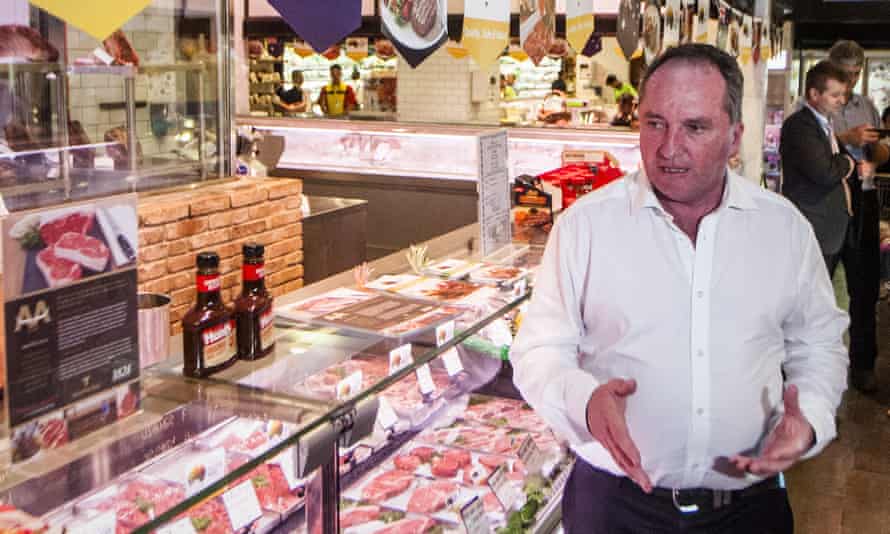Extract from The Guardian
A classic line from the feverish depths of inane climate exchanges seems to have resurfaced. Adam Morton explains it to Naaman Zhou … quickly

Last modified on Thu 24 Jun 2021 16.53 AEST
Hi Adam. I remember, way back in the heady days of 2012, the Gillard government, and the “carbon tax”, there was much talk of a “$100 roast”. Why in the world am I hearing about it again?
Hi Naaman. Good memory! It was in November 2012 that Barnaby Joyce, then a humble Queensland senator, said the Gillard government’s price on carbon, which Tony Abbott as opposition leader successfully labelled a “tax”, would mean Australian consumers would be paying “over $100 for a roast”. In fact he went much further, and said the price of a single cow to abattoirs could rise as high as $575,000.
But the Abbott government repealed the carbon legislation as soon as it was elected in 2013. Didn’t that slay the beast of the $100 roast for good?
You can thank another Queensland Nationals senator, Matt Canavan, for its return. Canavan is the most outspoken opponent within the Morrison government of any action on climate change.
He’s worried about a new “carbon tax”?
Yes. Canavan’s target is any movement towards a formal policy by the Australian government to set a target of net zero emissions by 2050, which he says would imply a carbon price. Like Joyce in 2012, he claims any action in this direction will have a disastrous effect on consumer prices.
Obviously there is some solid evidence behind this claim?
This is what we have. Writing in the Australian on Thursday, Canavan says: “Every cow emits about 2,300kg of carbon dioxide equivalent gases a year. The CSIRO estimated last year that to reach net zero emissions we would need to start with a carbon price of $30 a tonne now. Even a relatively small cattle producer runs about 1,000 head. So they would be up for a $70,000-a-year cost under a net-zero policy.
“By 2050, the price would rise to more than $200 a tonne, taking the carbon bill on your steaks to a whopping $400,000 per year, per farm. Who will pay for this? It will be paid by you, at the self-serve checkout, in your local Woolies. You will have to use your PIN every time because it is unlikely any of your shops will be under $100.”
As Fran Kelly put to him on RN Breakfast, that sounds a lot like the $100 roast argument.
Are there any problems with this argument?
It’s nonsense. For one, the CSIRO study was merely indicative, and neither major party has any plan to introduce a carbon price, let alone impose one on farmers. The Coalition takes a (to date, largely ineffectual) subsidies approach to cutting emissions. It is far more likely to pay farmers than impose any costs. This, remember, is the government behind the “technology, not taxes” mantra.
It already has the $2.5bn emissions reduction fund, which allows farmers to apply for the government to pay for it to cut emissions, and David Littleproud – the agriculture minister and Nationals’ deputy leader – has been spruiking further incentives announced in the May budget.
There has never been a suggestion that a carbon price in Australia would cover methane emissions from livestock. Agriculture was completely excluded under the abolished system.
Taking a broader view, Canavan dismisses the evidence that Australia risks having increased carbon costs imposed on it if it does not act while the rest of the world sets tightening emissions targets. We know carbon border taxes on goods from countries that are not acting on the climate crisis are under live consideration in some countries. And we know much of the farming community recognises this, and wants to act.
We also know that scientists are developing new options to reduce methane from cattle that were not available all that long ago – adding synthetic and seaweed-based supplements to feed, for example.
The real question for the agriculture sector is not whether it is going to cut emissions. It is whether it is going to have to do it belatedly and despite the government, or with its guidance and support.
So it’s a good job no one is taking Canavan seriously.
You would like to think so. But he is a close confidant of Joyce, and called for the leadership spill that led to Joyce’s return as deputy prime minister this week. We could be at the start of the second wave of $100 roasts.
No comments:
Post a Comment